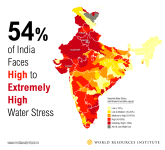I am surprised at how Pollyannish many people are about the effects of human overpopulation.
I am dismayed by how many apparently rational people in the 2020s still think that "human overpopulation" describes a plausible state of affairs.
"Human overpopulation" isn't a thing. It describes:
a) A fear, widespread in the 1960s and '70s, of a then plausible state resulting from the indefinite continuation of mid-20th century rates of population growth, whereby population was extrapolated to reach hundreds of billions within as few as five or six generations; Rendered moot by the collapse in fertility rates over the succeeding two or three decades, and ridiculous by the continuation of that collapse; or
b) A racist 'dog whistle', used to imply that 'they' will overwhelm 'us' unless 'we' act to match or exceed 'their' observed fecundity. This idea has zero basis in reality, and is factually wrong on every possible level.
To describe the recognition of these facts as "...how Pollyannish many people are about the effects of human overpopulation" seems to be a strawman; IF people were living in the fictional universe predicted (quite reasonably, given the information available at the time) at the end of the 1960s, THEN their disinclination to seek remedies for the population 'problem' might be described as "Pollyannish". But we're not, so it can't.
According to the predictions of people like Ehrlich, William and Paul Paddock, and other authors between the late 1950s and early 1970s, human population would have been about 16 billion by 2010, with the only possible reason to not hit that number being massive worldwide famines in the 1970s, '80s and '90s.
No such famines occurred. Indeed, no notable famines on the scale of the early to mid 20th century famines occurred at all; The last significant famine event in human history was the "Band Aid/Live Aid" famine in Ethiopia in the mid 1980s. The cause of that famine was civil war; Today, Ethiopia's population is almost treble what it was at the start of the 1980s famine, and yet there are no food shortages there.
Humans are not insects.
And a lot of people are making a very comfortable living prophesying doom (as it has always been) but few seem to grasp the difference between a reserve and a resource. Uranium is inexhaustible. That the same people who spout absurdities about 'overpopulation' and the unthinkable dangers of our safest technology ever for making electricity, say otherwise, should come as no surprise. Idiots gonna idi.
We have real existential threats, such as our increasing atmospheric carbon dioxide levels, to concern ourselves with. We need to stop being distracted by non-existent threats like 'overpopulation', 'resource depletion' and 'The Rapture'.
The lithosphere is fucking huge. We're not going to run out of anything (except possibly helium); And human population will never reach twelve billion - and we're already producing enough food for that many people.
There are real problems. But they're not caused by 'overpopulation', or even by population in any useful sense. Climate change is caused by carbon dioxide emissions. That's not a population problem; It's a burning fossil fuel problem, and is largely caused by a tiny fraction of our current population.
Slaughter the poorest 90% of humanity, and you would have pre-industrial population levels, and STILL have a carbon dioxide emissions problem.
Such problems could only be 'solved' by population reductions, if your proposed reductions are in the order of 100%. That's not acceptable. Find better solutions.



